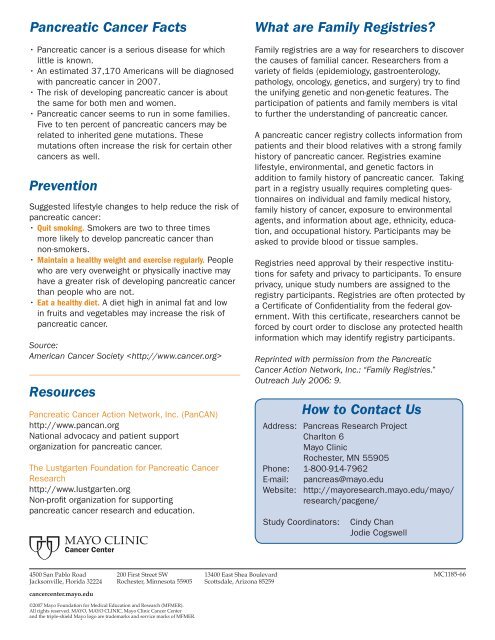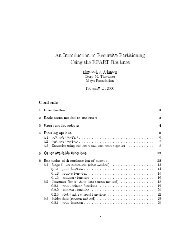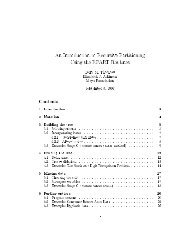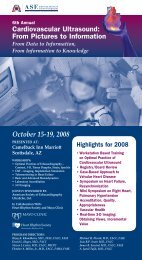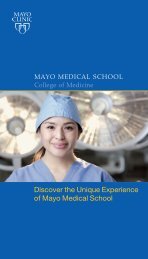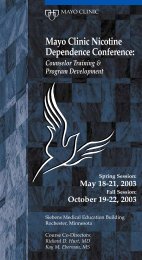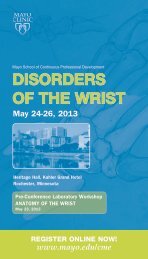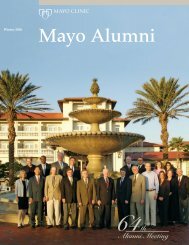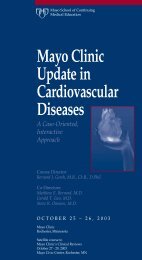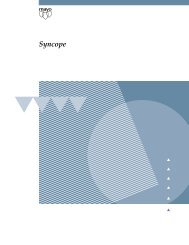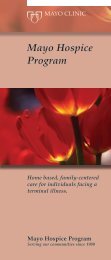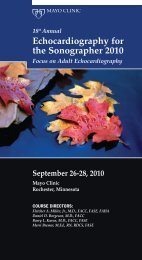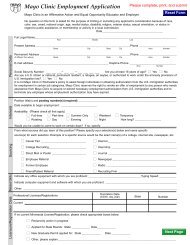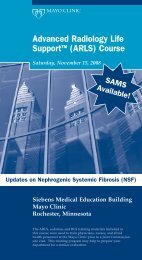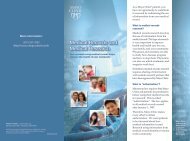Newsletter Familial Pancreatic Cancer Resea ... - Mayo Clinic
Newsletter Familial Pancreatic Cancer Resea ... - Mayo Clinic
Newsletter Familial Pancreatic Cancer Resea ... - Mayo Clinic
You also want an ePaper? Increase the reach of your titles
YUMPU automatically turns print PDFs into web optimized ePapers that Google loves.
<strong>Pancreatic</strong> <strong>Cancer</strong> Facts<br />
• <strong>Pancreatic</strong> cancer is a serious disease for which<br />
little is known.<br />
• An estimated 37,170 Americans will be diagnosed<br />
with pancreatic cancer in 2007.<br />
• The risk of developing pancreatic cancer is about<br />
the same for both men and women.<br />
• <strong>Pancreatic</strong> cancer seems to run in some families.<br />
Five to ten percent of pancreatic cancers may be<br />
related to inherited gene mutations. These<br />
mutations often increase the risk for certain other<br />
cancers as well.<br />
Prevention<br />
Suggested lifestyle changes to help reduce the risk of<br />
pancreatic cancer:<br />
• Quit smoking. Smokers are two to three times<br />
more likely to develop pancreatic cancer than<br />
non-smokers.<br />
• Maintain a healthy weight and exercise regularly. People<br />
who are very overweight or physically inactive may<br />
have a greater risk of developing pancreatic cancer<br />
than people who are not.<br />
• Eat a healthy diet. A diet high in animal fat and low<br />
in fruits and vegetables may increase the risk of<br />
pancreatic cancer.<br />
Source:<br />
American <strong>Cancer</strong> Society <br />
Resources<br />
<strong>Pancreatic</strong> <strong>Cancer</strong> Action Network, Inc. (PanCAN)<br />
http://www.pancan.org<br />
National advocacy and patient support<br />
organization for pancreatic cancer.<br />
The Lustgarten Foundation for <strong>Pancreatic</strong> <strong>Cancer</strong><br />
<strong>Resea</strong>rch<br />
http://www.lustgarten.org<br />
Non-profit organization for supporting<br />
pancreatic cancer research and education.<br />
What are Family Registries?<br />
Family registries are a way for researchers to discover<br />
the causes of familial cancer. <strong>Resea</strong>rchers from a<br />
variety of fields (epidemiology, gastroenterology,<br />
pathology, oncology, genetics, and surgery) try to find<br />
the unifying genetic and non-genetic features. The<br />
participation of patients and family members is vital<br />
to further the understanding of pancreatic cancer.<br />
A pancreatic cancer registry collects information from<br />
patients and their blood relatives with a strong family<br />
history of pancreatic cancer. Registries examine<br />
lifestyle, environmental, and genetic factors in<br />
addition to family history of pancreatic cancer. Taking<br />
part in a registry usually requires completing questionnaires<br />
on individual and family medical history,<br />
family history of cancer, exposure to environmental<br />
agents, and information about age, ethnicity, education,<br />
and occupational history. Participants may be<br />
asked to provide blood or tissue samples.<br />
Registries need approval by their respective institutions<br />
for safety and privacy to participants. To ensure<br />
privacy, unique study numbers are assigned to the<br />
registry participants. Registries are often protected by<br />
a Certificate of Confidentiality from the federal government.<br />
With this certificate, researchers cannot be<br />
forced by court order to disclose any protected health<br />
information which may identify registry participants.<br />
Reprinted with permission from the <strong>Pancreatic</strong><br />
<strong>Cancer</strong> Action Network, Inc.: “Family Registries.”<br />
Outreach July 2006: 9.<br />
Address: Pancreas <strong>Resea</strong>rch Project<br />
Charlton 6<br />
<strong>Mayo</strong> <strong>Clinic</strong><br />
Rochester, MN 55905<br />
Phone: 1-800-914-7962<br />
E-mail: pancreas@mayo.edu<br />
Website: http://mayoresearch.mayo.edu/mayo/<br />
research/pacgene/<br />
Study Coordinators:<br />
How to Contact Us<br />
Cindy Chan<br />
Jodie Cogswell<br />
MC1185-66


